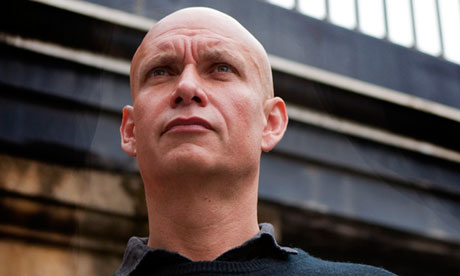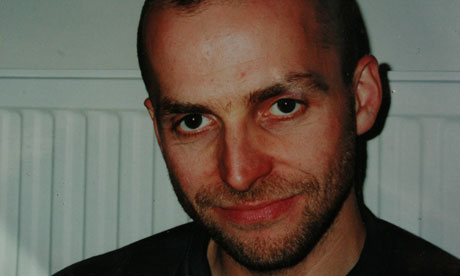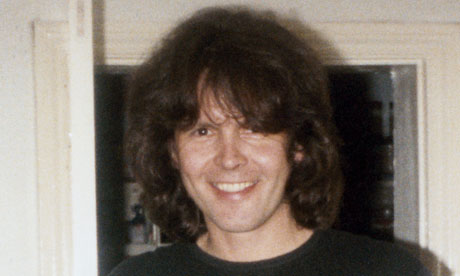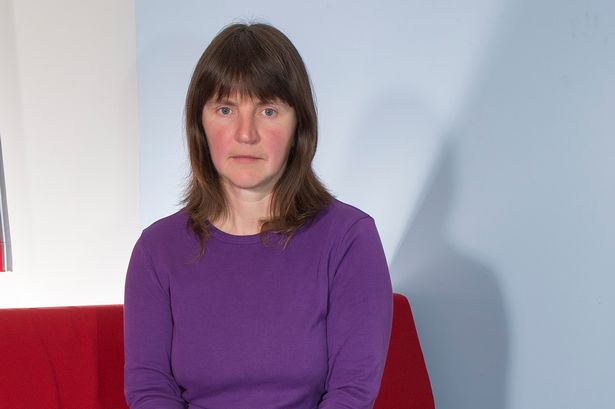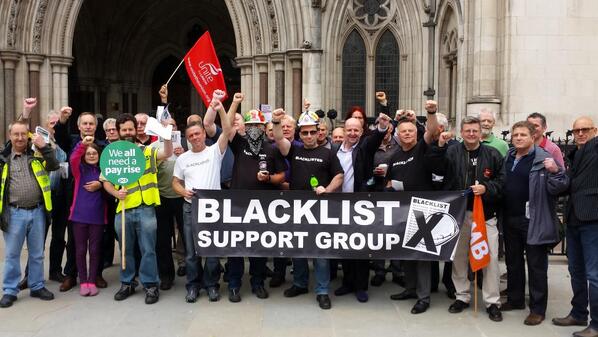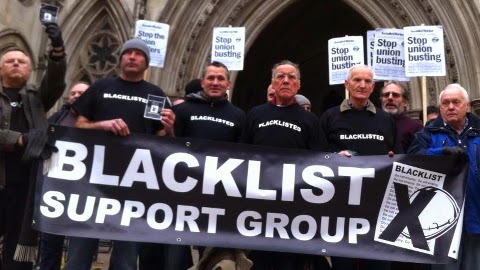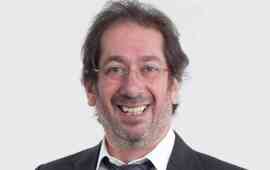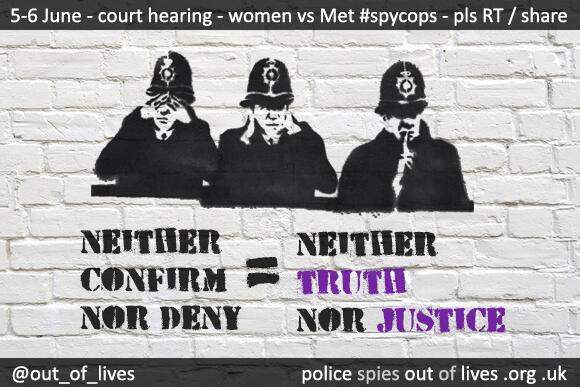Prosecutors and Police Engineering Miscarriages of Justice
Prosecutors have finally admitted that a defendant in a court case was an undercover police officer. Jim Boyling was a Special Demonstration Squad officer, deployed under the name Jim Sutton.
In 1997 he was on trial with a group of other Reclaim The Streets activists after being arrested a protest at a London Transport office. Having sworn to tell the truth, the whole truth and nothing but the truth, he lied and lied and lied.
Whilst most, including Boyling, were acquitted, John Jordan was convicted. Last year the conviction was quashed but the Crown Prosecution Service refused to say why. Their given document of reasons was literally a blank sheet of paper.
The fact that Metropolitan police chief Bernard Hogan-Howe had already publicly declared that ‘Sutton’ was an undercover officer made no odds. They admitted that Boyling was a police officer but – farcically sticking to the crumbling policy of ‘neither confirm nor deny’ – would not concede that he was an undercover officer, as if he might have had the full time activist persona of Jim Sutton of his own volition as some sort of hobby.
But in August police were forced to say that Boyling and his former boss Bob Lambert had both been undercover officers. Late last month the Jordan case was back in court and prosecutors finally admitted that Boyling had been deployed as an undercover police officer throughout the trial.
To have a police officer be party to all the defence meetings, in a position to help formulate that defence, is an extremely serious breach of lawyer-client confidentiality. That the trial went ahead is a serious abuse of the judicial system.
A fortnight ago the Crown’s QC, Richard Whittam, told the court
Had the Crown Prosecution Service known that ‘Jim Sutton’ was an undercover police officer, there is a strong likelihood that John Jordan would not have been prosecuted.
Note the careful wording – the CPS is not saying that it didn’t know Boyling was an officer, just implying it. The court was specifically told that this wasn’t actually an admission of anything at all.
WE’VE SEEN THIS BEFORE
Certainly, we know that the CPS have colluded with police to hide the existence of undercover officers from courts before, and that they’ve insisted that arrested officers are primed for being charged alongside bona fide activists.
On 12 April 2009 a group of 114 climate activists gathered in Nottingham to prepare to occupy Ratcliffe on Soar coal fired power station, but they were all pre-emptively arrested. One of their number was Mark Stone, aka police officer Mark Kennedy.
After he was exposed 18 months later, two official reports looked into collusion between the CPS and police in the Ratcliffe case. The Independent Police Complaints Commission’s report found the CPS knew about the activists’ plan before it happened, before many of the activists themselves.
Ex-judge Sir Christopher Rose’s was also asked to investigate the Ratcliffe case. His report quotes an email to police from the CPS about how ‘we will always be vulnerable on disclosure, especially matters covert’ and that even the lowly local CPS office ‘are aware there is an asset involved’. The CPS’ Case Management Review Panel of senior lawyers discussed
risks regarding the “right” questions being asked by the defence regarding covert practices.
Tellingly, while many of the activists were told that they would not be prosecuted, Kennedy was still retained in the ‘charging pool’. In early July 2009, Nick Paul – the Domestic Extremism Co-ordinator in the CPS Special Crime Unit – was asked by a Detective Chief Inspector not to charge Kennedy, but Paul rebuffed him.
To feel able to overrule such a high ranking police officer shows the level of confidence in Nick Paul and illustrates the degree to which this CPS official was controlling matters. Three months after Kennedy’s arrest the CPS were stubbornly intent on on charging him, which indicates that the CPS are not as averse to such things as their recent claim about Boyling would have us believe.
Of the initial 114 arrested, 26 were called for trial (Kennedy was not among them). It was split into two hearings. Twenty admitted participation but said their actions were justified. A further six said they had not participated in the plan.
As ‘the justifiers’ court date approached, prosecutor Felicity Gerry was told about the existence of an undercover officer. She knew Mark Kennedy’s real identity a week before any activists did. For the six weeks before trial, and every second she was in court, she knew that a police officer had filed evidence on the case that the defence were unaware of, yet she failed to mention it to the court. The twenty were wrongfully convicted.
When ‘the deniers’ came to court in January 2011, they asked to see Kennedy’s evidence that they knew exonerated them. Rather than disclose it, the Crown dropped the charges and the trial dramatically collapsed.
In a further display of shadiness, the CPS were said they had found
Previously unavailable information that significantly undermined the prosecution’s case
but specifically said it was
not the existence of an undercover officer.
This is now known to be a lie. If they lie about that, what else do they lie about?
It’s a pattern we’ve seen again this week as the case against British Guantanmo detainee Moazzam Begg was dropped at the last minute because MI5 had failed to hand over relevant documents. Although, again, the CPS refuses to actually admit its reasons for not going to trial.
TWO BUCKETS OF WHITEWASH
Sir Christopher Rose’s inquiry did not speak to interview the man at the centre, CPS Special Crime Unit Domestic Extremism Co-ordinator Nick Paul. Rose – who, as a Surveillance Commissioner had the ultimate sign-of on the validity of Kennedy and co’s deployment and thereby suffered a conflict of interest – concluded that mistakes had been made but there was nothing untoward and ‘the failures were individual, not systemic’.
The Director of Public Prosecutions, Kier Starmer, went on Newsnight to defend the report. Paxman’s opening question was
Are you absolutely certain there are no other cases in which people have been convicted on the basis of the evidence of undisclosed undercover police officers?
He repeats the question three times in the opening minute and a half of the exchange but still doesn’t get an answer. Starmer merely says that Rose has decided there’s no systemic problem.
Yet, as was already well known, there had already been the Drax 29 case. In June 2008 another group of climate protesters halted a coal train bound for Drax power station in Yorkshire. Again, Mark Kennedy had been involved and, again, this had been kept from the court and another miscarriage of justice was engineered with all 29 convicted. This involved a completely different team of CPS prosecutors. The reality is that the problem is systemic.
That said, both cases were overseen by the same Domestic Extremism Co-ordinator, Nick Paul, in the London CPS office. He shared that office with the Director of Public Prosecutions, Kier Starmer, yet Starmer appears not to have asked Paul about the systemic problems of prosecutors and police withholding evidence in these cases. Soon after the Ratcliffe debacle was exposed, Paul left the CPS, going into private law practice at Doughty Street Chambers. After Starmer stepped down as DPP, he joined Paul there.
HOW MANY MORE? AND WHO DID IT?
The recent admission of Jim Boyling not merely supplying withheld evidence but actually being a defendant takes it all to another level.
If all this is what we know from the handful of secret police officers so far exposed, how big could the problem be? When Mark Ellison QC looked into the spying on the family of Stephen Lawrence, it was immediately apparent to him that wrongful convictions were a serious issue and what was known could be but a tiny fraction of what has occurred. He is currently investigating.
Whistleblower officer Peter Francis praised Ellison’s initiative and criticised
the so called ‘independent’ inquiry being undertaken by Operation Herne, which has so far proved ineffective and appears to be a damage limitation and containment exercise, rather than a proper investigation into past wrongs.
These miscarriages of justice were conducted because of the actions of my former colleagues in the SDS and also officers in the NPOIU and their superiors. I hope that the second inquiry being undertaken by Mr Ellison QC will prove far more robust and transparent in its investigation and findings.
Jim Boyling went through a trial in his undercover persona. He also gave a witness statement for another trial under his false identity (ironically the defence barrister was Kier Starmer). His mentor Bob Lambert admits that he was also prosecuted under his false identity (but says he can’t remember if he was convicted). If that isn’t perjury and perverting the course of justice, it would be interesting to know what is.
But more importantly this collection of cases, spanning different constabularies and eras, surely fits anyone’s definition of a systemic problem and indisputably rubbishes the conclusion of the Rose report.
Who is to blame? The police themselves or the Crown prosecutors who waved it through and, it appears, actively retained officers for prosecution against police wishes?
The CPS are still not saying why they quashed John Jordan’s conviction. It had previously been guessed that they were protecting the identity of Jim Boyling. Now that is known not to be the case, what possible reason is there for not saying what really went on in that case? Is this just force of habit, refusing to disclose anything until compelled? Or is there some other, more sinister and corrupt, reason?
Legal action by the Guardian, BBC and Press Association continues to try and force disclosure.
JUSTICE FOR A FEW, WHAT ABOUT THE MANY?
The Drax and Ratcliffe convictions have now been quashed. Had activists not exposed Kennedy, these convictions and the 20 from Ratcliffe would stand. The six ‘deniers’ would surely have also been convicted. Mark Kennedy was responsible for 49 wrongful convictions that we know of.
If the other political secret police officers have done the same, it means around 7,000 miscarriages of justice since these counter-democratic spy units were formed in 1968. Even if we conservatively estimate one per officer per year of service, it will be around 600. We could well be looking at the largest corruption of the judicial system in history.


